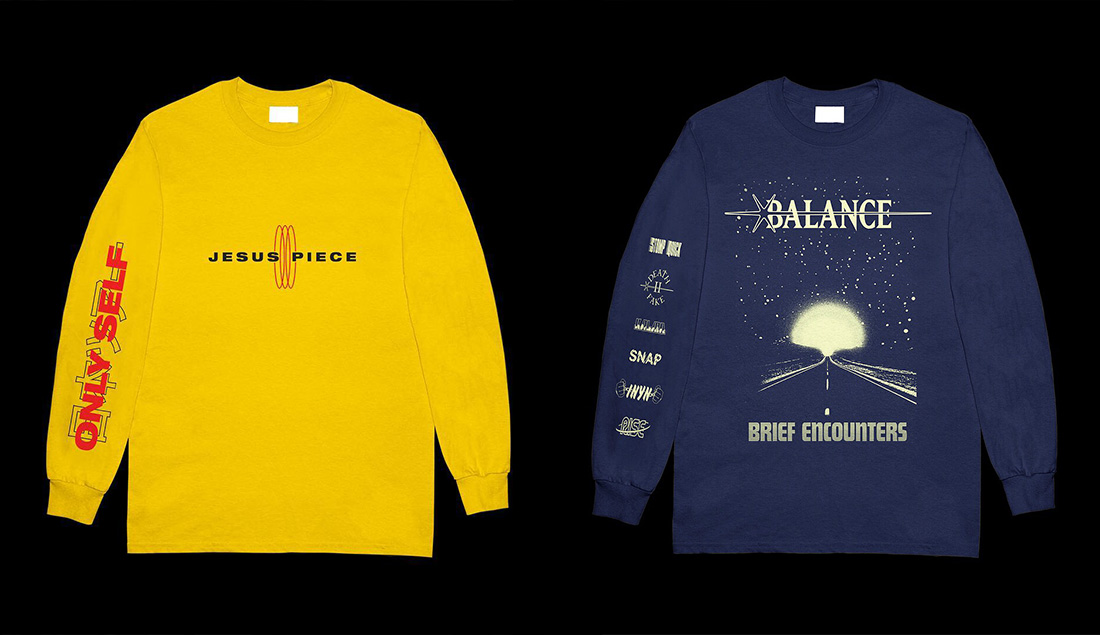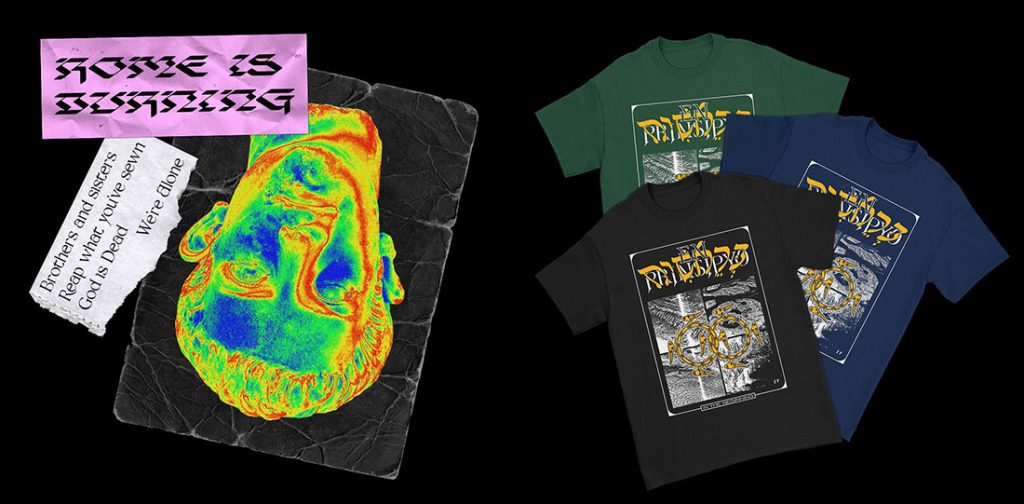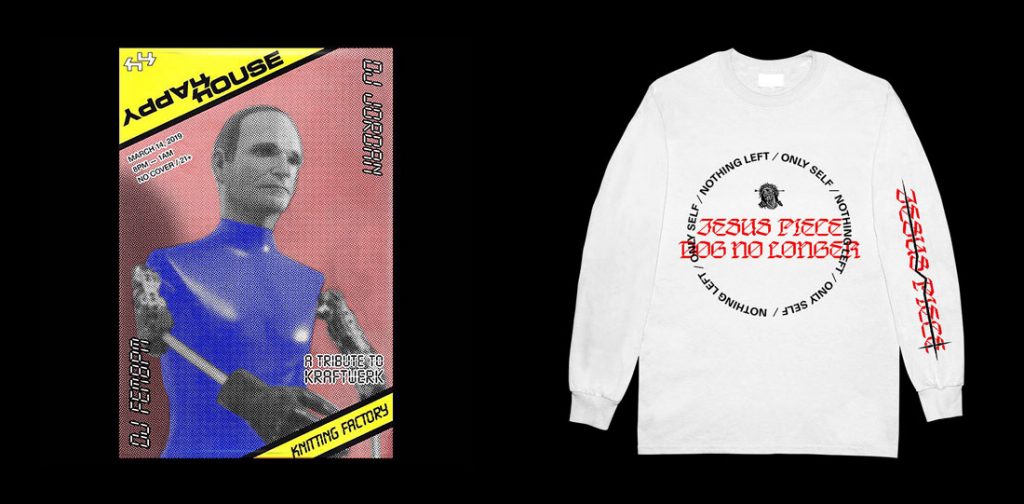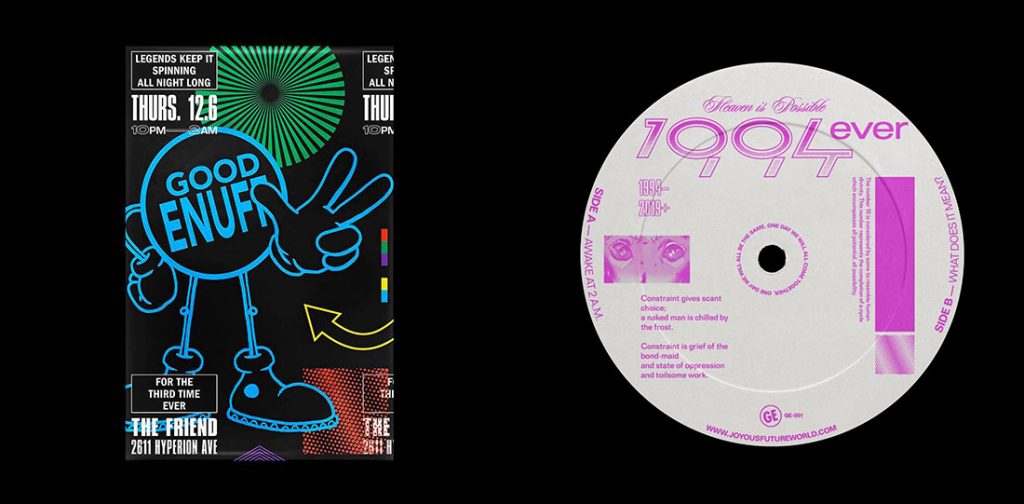
People will pay good money for eye-catching band T-shirts and merch, but there’s a key to making sure they actually sell. Thankfully, we’ve worked with a few designers who specialise in designing for music clients, and they’re happy to share their knowledge.
With an aesthetic underscored by his indebtedness to science fiction and a penchant for anachronism, Jackson Green’s work is some of the most captivating and recognisable music design around. Born in Philadelphia, Jackson is now based on the West Coast for his permanent design role at Mad Decent Records.
To find out how to make T-shirts and merch that actually sell, we had to talk to one of the best in the game.
LEARN YOUR CRAFT
Technical skills are the cornerstone for your work, so get deep into your process and gather the best skills you can, says Jackson. That doesn’t have to mean access to an expensive education, though. Jackson, who attended a public college, advocates using “anything that levels the playing field.” That means online tutorials, YouTube, books and asking lots of questions. Put yourself in challenging situations and “take on slightly more than you think you’re capable of”.
HUMAN ANATOMY 101
To sell merch and make bank you need to understand human anatomy and be sure of how the blanks you’re using will fit on a body. Jackson personally owns an archive of hundreds of T-shirts he’s collected over the years. “I’m obsessive. I keep a copy of everything!” he laughs. You don’t have to go that far, but at least study how a Gildan tee sits. Placement and print choices also massively affect the perception of form, so acknowledge them and practice placing them. “It’s similar to knowing that vertical stripes are slimming,” Jackson explains. If you’re working from someone else’s design – like Jackson did with Jesus Piece’s hellfire-themed album artwork – get to know the design and vocabulary behind it before marrying them together onto the human form.

FIND YOUR OWN STYLE
You also need to develop your own distinctive design voice. There are countless books and papers on what makes work eye-catching – but Jackson wants you to avoid a “paint by numbers” approach. His first tips are to: “Pay attention to how things look, pay attention to how things don’t look, find niches, explore aesthetics”. Look at Jackson’s work and you’ll see bold colours and custom typefaces, but the story behind this artist’s work runs deeper. His personal style comes from things he connects with and his own philosophical leanings.
Science fiction has always informed Jackson’s work and he cites ideas from Hideaki Anno’s Neon Genesis Evangelion as a major influence. The artist also blends imagery that purposely feels out of its chronological lineage – “I try to blend things in a way that it creates a sense of temporal ambiguity. I want people to wonder if it’s from far in the future or from the distant past” – but that doesn’t mean you should do the same! Find your own ideology then let it consume you and guide your work. Remember, aesthetic styles come and go but your ethos will always be your own.
LEARN TO COMMUNICATE
When someone buys a band tee they’re buying into what the band represents, so always remember you’re there to visually communicate the band’s ideas – not your own. Jackson describes his own work as dealing with the “explanatory gap – that grey area between statement and intent” – and recommends approaching each job like a challenge.
His best advice? Transparent communication and “a lot of back and forth.” The end result might not share the message exactly as you might’ve chosen to, but translating a band’s ideas and beliefs take precedence. “We’re all just people screaming into an endless void hoping we get the point across,” Jackson muses. “If we can help someone communicate their ideas that’s a really wonderful thing.”
LEARN FROM THE BEST
Reaching out to people whose work you like is invaluable. “It’s all about putting it out there that you’re looking,” Jackson declares. His iconoclastic merch runs for hardcore band Jesus Piece came directly from knowing the Philadelphia band and, as a teen, he reached out to Paul Nicholson, the designer behind the Aphex Twin logo, and asked him to crit his work. In fact, the artist’s job at Mad Decent came directly from posting that he was looking for work on Instagram. Being vulnerable to rejection is daunting, but you have to get over it. As the Philly native says, “You lose nothing by sending a message but you have everything to gain. The potential positives of actually doing things are infinitely rewarding.”

BE REAL
Graphic design is swamped with talent. To get noticed, make work that comes from the heart. Really! If you’re telling someone else’s story – internalise their passion and marry it with your love for communication. While there’s nothing wrong with liking something just because it’s cool, Jackson is adamant that, “You can always tell who is pouring their heart and soul into it compared to people doing it just because it’s neat.” Let that real you translate to your socials and online presence.
Everyone wants a connection with the person whose work they’re looking at – that’s what gets you paid and grows a following. Take Jackson’s own super-curated Instagram. “It’s laid out because that’s how I naturally approach things. It’s related to who I am and my worldview,” he explains.“Your brand should be one that reflects who you are. That’s what people are interested in”.
PRINTERS AT WORK
Printing is what brings your work to life, so nail it. Mistakes do happen but reduce your margins for error. Jackson’s first tip is to learn to print T-shirts yourself. You’ll quickly come to understand the mechanisms and what is – and isn’t – possible. Printing your own merch also means you keep control of production, but that can be time-consuming. An alternative is using a printer like Everpress, which ensures you’re never left with excess stock. If you can – ask your printer how they want the work files set up.
Working with printers is also a great way to meet new people. Jackson was introduced to rave aficionado and mastermind behind NASA clothing DJ Scotto when he was looking for someone to produce merch. If you’re not happy with a print job, he reminds you to stay calm while acknowledging your work’s value. “If a printer ends up being shitty that’s the lump you take. Just know you’ll never work with them again. And tell your friends not to either.”

BE HUMAN
Ultimately, being friendly and listening to what the people you’re working with have to say goes infinitely further than being good at design. For the now West Coast-based artist, learning to understand other people is what’s best served his career, “if I was great at design but I was a dick no one would want to work with me!” Jackson laughs. Growing your relationships and letting those real, human connections shine through in your work should be your endgame. After all, “If you can’t communicate ideas so that an average person can engage with them then you’re missing half the story.”


